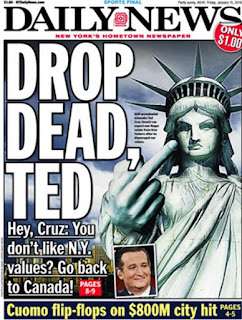Here is an excerpt of the book (p. 226) above. I have always found the rivalry between rural and urban America fascinating. What a happy coincidence that the Donald Trump/Ted Cruz dust up is occurring just as I was reading about the nearly peerless awfulness that was the presidential election of 1928.
The city made no effort to conceal its contempt for rural mores. [H.L.] Mencken contended that the farmer was not a member of the human race. The New Yorker, founded in 1925, the epitome of urbane wit light-years removed from country foolery, boasted that it was "not for the old lady in Dubuque." In Dorothy Parker's epigrams at the Hotel Algonquin, in the joyously raucous nasality of Al Jolson, and in the Manhattan provincialism of [Mayor] Jimmy Walker and Texas Guinan, the city created a world in which traditions of small-town America were almost unrecognizable.
Rural leaders in turn attacked New York as the modern Gomorrah. The Broadway theater, expostulated the Methodist Board of Temperance, Prohibition and Public Morals, was "naked, profane, blasphemous and salacious." The city, rural traditionalists expounded, harbored hordes of aliens indifferent or hostile toward fundamental American values. "New York," wrote the Denver Post in 1930, "has been a cesspool into which immigrant trash has been dumped for so long that it can scarcely be considered American any more." New York was, as Bryan had long ago said of the East, "the enemy's country." It was cruel and impersonal, the abode of the rootless, a place where, as one writer noted, "nobody seemed to have parents."So what does it mean today? Would it be unfair to assert that most if not all of the attacks on President Obama and Democrats today stem from this conflict? New York City is the stand-in here for all big cities, but would you be the least bit surprised to hear "Chicago" inserted in Gotham's place by some republican blowhard on the news? Today's rural folk have been neatly branded into "Real Americans" by con artists looking to exploit them. In the 1920s the split was real, there were liberal populists in rural America and liberal Progressives in the cities, and there were conservative bible-thumpers in the hinterland with conservative businessmen in the city. The parties were more or less split into regional concerns with a Republican North against the Democratic South. The fault lines were not as concrete then, but the conflict was still real.
Today it feels like the rural versus city values are more a matter of ideology than physical location. So many authors on liberal blogs have biographies that sound like "a blue American trapped in red America." How many liberal teachers, professors, librarians, etc. put up with being trapped in small towns where they are surrounded by ignorant rednecks? How do real ranchers and farmers put up with urban cowboys with their spotless boots, hats, and pickup trucks?
Of course the biggest mystery is how do the hateful rednecks and hillbillies who show up to Trump rallies not instinctively recoil from this embodiment of New York City and all of the "cesspool" images that that city still conjures in their minds? How does Trump not burst out laughing at these people whom he holds in such contempt and would never let rent one of his luxury high-rise apartments? Is the authoritarianism among "leader" and followers so strong that they are each willing to tolerate the others' faults in pursuit of sticking it to the liberals?
Then there is Teddy boy Cruz nakedly yukking it up with the other grifters of Duck Dynasty by pretending to go duck hunting. The scraggly head of the Robertson clan lies right into the camera for Teddy boy claiming that this Canadian-born product of elite Northeastern universities is one of "us." I guess he is trying to succeed in this con where John Kerry failed by getting his face dirty?
The battles may be different, the players more slick, the parties aligned slightly more consistently, but we have been here before. It did not end well then, so far it isn't going so well for us either.


No comments:
Post a Comment